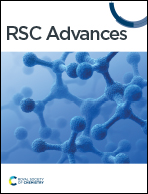LiFePO4/C twin microspheres as cathode materials with enhanced electrochemical performance†
Abstract
Self-assembled lithium iron phosphate (LiFePO4) with tunable microstructure is an effective way to improve the electrochemical performance of cathode materials for lithium ion batteries. Herein, self-assembled LiFePO4/C twin microspheres are synthesized by a hydrothermal method using a mixed solution of phosphoric acid and phytic acid as the phosphorus source. The twin microspheres are hierarchical structures composed of primary nano-sized capsule-like particles (about 100 nm in diameter and 200 nm in length). The uniform thin carbon layer on the surface of the particles improves the charge transport capacity. The channel between the particles facilitates the electrolyte infiltration, and the high electrolyte accessibility enables the electrode material to obtain excellent ion transport. The optimal LiFePO4/C-60 exhibits excellent rate performance with discharge capacity of 156.3 mA h g−1 and 118.5 mA h g−1 respectively at 0.2C and 10C, and low temperature performances with discharge capacity of 90.67 mA h g−1 and 66.7 mA h g−1 at −15 °C and −25 °C, respectively. This research may provide a new pathway to improve the performance of LiFePO4 by tuning the micro-structures by adjusting the relative content of phosphoric acid and phytic acid.



 Please wait while we load your content...
Please wait while we load your content...